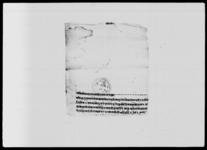A rukkā from King Rājendra re the provision of a sacrificial buffalo (VS 1870)
ID: PN_0016_0004
Edited and
translated by Astrid Zotter
Created: 2020-07-13;
Last modified: 2020-09-27
For the metadata of the document, click here
The accompanying edition, translation/synopsis and/or commentary are available under the terms of the Creative Commons Attribution-ShareAlike 4.0 International License
Abstract
This document orders the amālidāra of Kuṭūvāla village to buy a buffalo needed for the Dasaĩ festival and to have it brought to Kathmandu.Diplomatic edition
[1r]
1श्रीदुर्गा\1⟪4.⟫ [Royal seal] 1स्वस्तिश्रीमन्महाराजाधिराजकस्यरुक्का¯ ¯ ¯ ¯ ¯ ¯ ¯ ¯ ¯ ¯ ¯ ¯ ¯ ¯ ¯2आगेकुटूव़ालगाऊकाअमालिदारप्रतीमामुलिदसैकारांगाषरिदगर्नाला
3ईरुपैया२पठायाकोछवाढेय़ाचोषोठूलोषुनकेहिनभय़ाकोरागा१स
4प्तमीकादिनकाठमाडौईट्टाचपलीपुर्याईदे•जोपुर्यावैनसोअपस
5रिय़ाहौलाईतीसम्वत१८७०सालमीतीभादौवदि८•रोज६शुभम्
Translation
[1r]
Śrī Durgā
41
[Royal seal]
Hail! [This is] an executive order (rukkā) of the supreme king of great kings.
Āge: to the amālidāra of Kuṭūvāla village
Rupees 2 have been sent [herewith] in order to buy the usual buffaloes2 [needed as sacrificial animals] for the Dasaĩ festival. Bring 1 good, pure, big buffalo without any deficiencies on the saptamī day (i.e. the seventh of the bright half of Āśvina) to Kathmandu, [to] the Iṭṭācapalī3 . He who does not bring [it] will be [considered as] a rebel (apsariyā).
Saturday, the 8th of the dark fortnight of Bhādra of the [Vikrama] era year 1870 (1813 CE). Auspiciousness.
Commentary
This royal order concerns the procurement of buffaloes needed as sacrificial animals during the Dasaĩ festival. Similar documents are extant for other years in the early Śāha period. In all of them the amālidāras (or amālīs) of certain places were ordered to buy and bring buffaloes, invariably characterized as "pure" (cokho), "big" (ṭhūlo) and "without deficiencies" (khuna kehi na bhayāko or nikhuna), often also as "good" (baḍhiyā):
In VS 1853 (1796 CE) such orders went out to the amālidāras of 136 villages to send altogether 193 buffaloes (Regmi 1985: 150; Regmi Research Collection 23, pp. 53–56). Among these, a village named Kaṭuvāla village required to supply one buffalo is perhaps the Kuṭūvāla village of the present document. According to the RRC copy of that earlier text, the buffaloes were to be delivered on the 16th day4 of Āśvina to the "palace, the Iṭācapalī" (aghikā rīta lina niṣuna coṣā ṭhulā rāgo goṭā 1 kharida garī asaujakā dina 16 jā̃dā darvāra īṭācapalī lyāī puryāva sarvathā; E_2430_0002). In VS 1859 (1802 CE) a rukkā— now part of the "Hodgson Papers" (Vol. 55, item 20, fol. 116; http://catalogue2.socanth.cam.ac.uk:8080/exist/servlet/db/Hodgson/hodgson.xq)—ordered the amālidāra of Kabilāsapura, in words almost identical with the present document, to buy and bring a buffalo to Nuvakoṭa on saptamī and deliver it to the dvāre there, adding that it should be brought in accordance with the same order annually (prativarṣa yesai bamojima lyāūnu). In VS 1887 (1830 CE) the āmāli of Simras was ordered to deliver a buffalo"to the Itachapli (office) on Aswin Sudi 2" (Regmi 1975: 51; RRC 44, pp. 67–685 )

